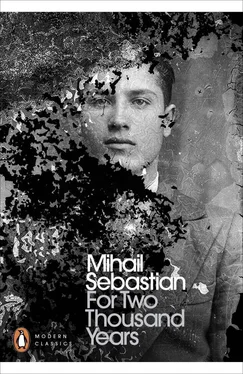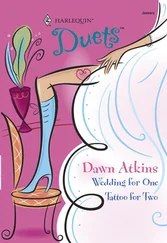‘Hello!’ shouted Dronţu randomly, in case anyone could hear.
Nobody replied and we wandered on in that ringing silence, far past the edge of the village, from where you could see the scaffolding of the first test wells some three kilometres away.
Despite our strange reception, the fine rain in our faces and that muddy washed-out road, the landscape was beautiful. Immense chunks of black earth had recently been cut from the flank of the hillside. Great boulders and the trunks of giant trees had been tossed about together as though in the wake of a giant plough.
A cold, gusty wind blew, the sharp smell of damp vegetation stronger than that of burning oil and coal.
From the derricks came the beating of hammers and the high, almost musical, whine of a saw. The sounds were distinct in the thawing March air.
The master looked around 360 degrees, taking in his domain, and I immediately understood that the project interested him. He made several sketches on the spot, took some photographs (I’m still amazed today at the speed with which he took in the relevant features of a site), noted some figures, gathered all the papers and prints in an attaché case and said briefly, in conclusion: ‘We’ll see.’
On the way back, in the automobile, I asked Rice to tell me something about the people who lived in Uioara.
‘Never seen them,’ he confessed. ‘They run away from me and I’m not crazy about them either. I paid for the land to the last penny, as evaluated by the surveys. What more do they want? They’re stubborn and stupid.’
‘It must be because of the plums,’ interjected Marin Dronţu.
‘What plums?’
‘The plum trees. Didn’t you see them? They’re white from top to bottom. No idea what the hell fell on them: cigarette ashes, coal dust — no idea what it could be.’
‘It’s drilling mud,’ Rice informed us. ‘What we used for test-drilling. Last autumn I took a first sounding from Hole A 19.’
‘But couldn’t the plum trees have been protected?’ exclaimed Dronţu, rather to our surprise.
‘Nonsense, sir. It’s clear you don’t know the oil business. There are inevitable risks. And they’re usually minimal. And what’s a plum tree at the end of the day?’
‘Well, this is the source of your quarrel with the people of Uioara. You don’t know what a plum tree is.’
I’ve recalled this comment of Dronţu’s many times, since there would have been no conflict in the area, no litigation, if it hadn’t been for those damned trees, which he, having come straight from the land, had seen from the first with his peasant’s eye.
‘This thing with the plum trees is serious,’ he tells me still, when at the derricks we come across somebody from Old Uioara and he looks straight at us, scowling, tugging his cap down over his ears to make sure we notice he’s not greeting us.
Rice understands nothing. ‘These people are crazy,’ he shouts. ‘Completely crazy,’ he goes on, ‘but you have to deal with their madness.’
I still laugh today when I remember old Ralph’s face in April five years ago, in his office in Piaţa Rosetti, when the master put the preliminary proposals before him.
To perform a new evaluation of the concession area and to distribute supplementary compensation. The village of Uioara will be moved from its present location to one several kilometres to the right, to the valley of the river Ursu, its new location. Conservation of all orchards beyond this point and the regeneration of those previously harmed by drilling mud and oil, and avoiding any future harm.
The present village of Uioara is being bought from the peasants who are its beneficiaries and will be at the disposal of the company for the construction of any buildings necessary in future: refineries, storage facilities, offices, housing for engineers and officials, roads to the wells and derricks. The village of Uioara is simply erased from its present location on the map and rebuilt in the valley of the river Ursu, so that nothing stands in the way between the wells and Company headquarters.
‘Absurd,’ shouted Ralph Rice. ‘Absurd,’ echoed all the mining engineers.
The master’s plan was indeed a grave matter. The risks were clearly great, and it was arguable whether it would succeed.
Nevertheless, Rice argued it. I’ll never forget the hours of fighting in the old man’s office, where the master, stimulated by coffee and cigarettes, argued until three or four in the morning night after night, using sketches, diagrams and figures, Rice listening to him, furious and sombre, pacing from one corner of the office to the other, exclaiming from time to time or beating his fist on the desk when he felt he couldn’t argue back. It was impassioned and exhausting.
The general meeting of technicians was indignant that an architect, a layman, had the nerve to stick his nose in business he did not understand.
‘Your job is to take care of the construction side of the business. To build a refinery, an office block and a number of homes. That’s all. What’s the hurry with oil, drilling mud and wells?’
‘I don’t care about your wells. Whether you’re extracting petrol, vegetable oil or whey, it’s all the same to me. However, I can’t build using scraps. I need a site and I need space. And furthermore, I can’t build an industrial complex in a village of viticulturists. And I can’t build to the right of the village, because I’m not so mad as to leave a belt of peasants between the complex and the wells whom you’ll fumigate or poison a year or ten from now, or else their plum trees, and who will one day get fed up with the smoke and set fire to you too, along with the wells and the whole petrol game.’
… The argument would go on until dawn without a conclusion, and with both combatants exhausted.
Every point of the plan was buried and resurrected ten times. Everything old Ralph acquiesced to would be retracted the next day, when he’d got his strength back. One day, when the matter seemed further from resolution than ever, he went along with everything, signed everything, surrendered completely. At the beginning of May, I turned the first sod. That was five years ago …
How hard it was and yet how simple! What I love most about architecture is its progressive simplification of an idea, how the dream takes shape. For all the precision of the original plans, there’s something nebulous about the beginning of any construction project, as the precision is technical and abstract, and the concrete feeling of realizing it comes only later, after life has begun cooperating with your work. In these five years of work all I can recognize is the outline of the master’s plans. The rest has come through surprises, through encountering opposition, through accidents.
‘ The village of Uioara will be moved several kilometres to the right, to the valley of the river Ursu .’ It was easy to say. And to do, up to a certain point. But we had to contend with unforeseen opposition, and were obliged to take account of superstitions and hidden forces which never figured in any plan. Nor is New Uioara exactly the village the master designed, a transplantation of the old community of viticulturists, held at arm’s length from Rice’s enterprises. And nor has Old Uioara been completely replaced by industrial buildings. There were some old maniacs who wouldn’t give up their old homes for anything and stupidly stayed on with their plum trees, battling waves of crude oil and drilling mud, and beyond in New Uioara some of the disoriented young men decided they’d had enough of tending vines and headed down into the valley, towards the wells, to become oil workers. This two-way traffic has changed the whole region, sweeping through old communities and precipitating changes in the structure of society. All this was too complex to have foreseen.
Читать дальше












